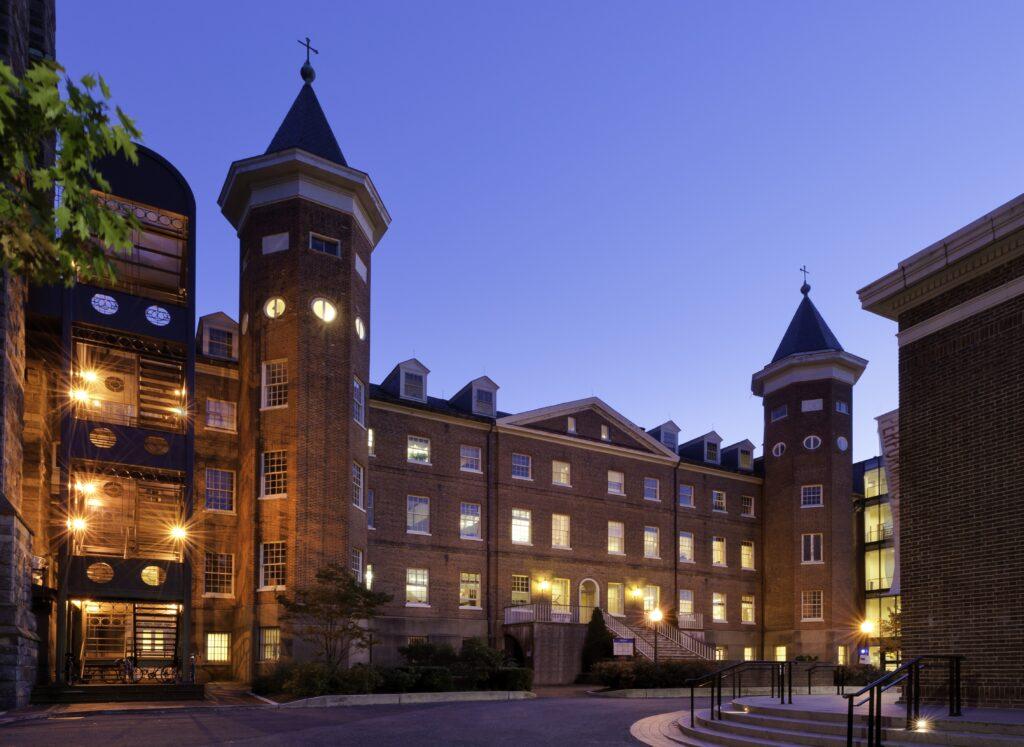Five teams were chosen to advance to the final round of the 2022 Georgetown University Public Policy Challenge, where participants submit policy proposals targeting a Washington, D.C. issue of their choice, for the chance to win $3,000 in prize money.
Faculty from Georgetown’s McCourt School of Public Policy reviewed over 50 proposed policy solutions, which was the most submissions ever received in the history of the program.

The five teams that qualified for this year’s final addressed topics relating to housing inequity, climate change, the opioid epidemic, support for new immigrants around Washington, D.C., and youth employability.
Ruth Watson (GRD ’23), a member of the team called “Within Reach: Ending Opioid Related Deaths in the District,” said the competition forced her to think about the interdisciplinary nature of medicine.
“This challenge forced us to think on a much broader scale about culture shifts at the community level. I think I speak for all of us when I say we enjoyed working with the folks at McCourt about crafting our policy and that we’re excited about how interdisciplinary (medicine + public policy for example) teams can work together for health promotion in the future,” Watson wrote in an email to The Hoya.
The team, which proposed providing training on how to recognize opioid overdoses and how to administer an overdose reversal drug, intranasal naloxone, included Kira Chandran (GRD ’23), Pei-Ying Kobres (GRD ’23) and Chloe Wang (GRD ’23).
Watson’s team was inspired by witnessing firsthand the impact of the opioid crisis.
“In addition to our experiences in the hospital and outpatient clinics, we were first responders to an opioid overdose last year on a side-walk in Ward 5 of DC,” the team wrote in a statement to The Hoya. “We had naloxone with us and we were able to reverse the overdose before EMTs arrived on the scene.”
The pool of applicants featured students from all eight of Georgetown’s graduate schools. A panel of 10 judges selected the five teams chosen to compete in a live final event April 1. Winners can use their prize money to finance the implementation of their policy idea.
The program provides graduate students with the opportunity to propose policy changes specific to challenges faced within the Georgetown and broader Washington, D.C. community, according to the Director of Student Engagement for the McCourt School of Public Policy Jaclyn Clevenger.
“The Policy Challenge allows students to explore the issues that impact the everyday lives of those who call the Washington, DC, region home,” Clevenger wrote to The Hoya.
Proposed solutions are evaluated on the basis of their innovation, feasibility, impactfulness and demonstrated understanding of the issue at hand, according to Clevenger.
Another team — composed of Rachel Wilson (GRD ’22), Atsuhiro Oguri (GRD ’22), Eli Landman (GRD ’23) and Rikki Ulmer (GRD ’23) — called “Small Buildings: Big Impact” focused on affordable housing, specifically protecting affordable housing in the District. It proposed awarding already existing buildings in the District with grants in order to protect affordable housing.
The team said it is proud of its proposal’s potential to create lasting impact for at-risk communities in the District.
“Our team has a very strong dynamic, and we each have a range of skills that complements the rest of the team’s strengths. This allowed us to create a comprehensive proposal and presentation that address a highly important local issue through a community-centric, data driven approach,” the team wrote in a statement to The Hoya.
Local media coverage of food deserts in the District prompted Mark Himes (GRD ’22) and Katherine Penland (GRD ’23) to propose their project “Vertical Farming: Elevating Equity and Eliminating DC’s Food Deserts.”
Another team, which included Husen Haikal Alhadar (GRD ’23), Meghna Chadha (GRD ’23), Angeli Grace Juani (GRD ’23), Jigyasa Sidana (GRD ’23) and Jeetwan Tripathy (GRD ’23), proposed a mentorship program for students in the District.
The team called its policy idea, “You CAN DC,” which stands for Youth Career Access Network DC.
“As we deliberated upon which local challenge to take on, we each shared with the team issues we were passionate about. We soon realized that youth empowerment through employment and education deeply resonated with us all, and thought we could make meaningful contributions to an important issue at this intersection,” the team wrote in a statement to The Hoya.
The team said its policy proposal was centered around knowledge it had gained while at Georgetown.
“At the heart of our solution is applying what we have been learning at Georgetown: using impact-driven planning and human-centered design to address policy gaps. This is what we believe differentiates our approach and solution, and will enable us to make a tangible difference,” the team wrote.














